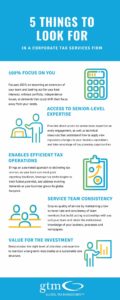The IRS is proposing a significant overhaul to Form 6765 which will impact taxpayers and tax professionals looking to claim the Research and Development tax credit (“R&D credit”). The proposed changes to Form 6765, Credit for Increasing Research Activities, mark the most significant overhaul to the form in many years. The revisions might appear daunting at first pass, but fortunately, taxpayers still have time to prepare and adapt their processes.
At GTM, we believe the Form 6765 changes, which we highlight in more detail below, present an opportunity for taxpayers willing to adapt and enhance their existing processes for a successful compliance season.
Why Are They Making Changes?
According to the IRS, the changes will provide taxpayers with a consistent and predefined format for tax reporting, improve the quality of information received for tax administration, and continue to build on their initiatives of managing R&D credit issues and internal resources.
The reality of the changes for taxpayers and practitioners will be a dramatic increase in the volume of reportable information collected on the revised Form 6765, as well as the amount of time needed to prepare the form.
What Are the Biggest Form 6765 Changes?
The proposed revisions introduce two new Sections: E and F.
Section E presents five questions:
- The number of business components,
- The amount of officers’ wages included in wages for qualified services
- Were there acquisitions or disposals of any major portion of a trade or business
- Were new categories of expenditures included in qualified research expenses (QREs)
- Were any QREs determined following the Accounting Standards Codification 730 Directive (“ASC 730”), which is discussed below.
Section F solicits both quantitative and qualitative information for each business component and extends beyond the five items of information set forth by Chief Counsel Memorandum (CCA) 2021410F. The nature of the qualitative information requested will be familiar to those currently familiar with the CCA. However, the detailed quantitative information requested goes beyond the CCA and exceeds the level of detail historically requested by the IRS during an audit.
Section F requires the following for each business component, amongst other items:
- Descriptive name
- The information sought to be discovered and identification of one or more alternatives evaluated in the process of experimentation
- Direct research wages for qualified services
- Direct supervision wages for qualified services
- Direct support wages for qualified services
- Cost of supplies
- Rental or lease cost of computers
- Applicable amount of contract research expenses
Section F is a window into the IRS’s lofty expectations about reviewing QREs by business component. Whether such expectations are reasonable is a question for another day and goes beyond the scope of this blog.
How To Manage The Form 6765 Changes
Adopt A New, Contemporaneous Process
The reality is that few taxpayers currently have processes in place to collect the information requested from the proposed Form 6765. Because the IRS views this detailed information as critical to supporting R&D credit claims, taxpayers should review their processes and adapt them to align with the proposed changes. The payoff: smoother federal and state tax filings and reduced audit risk. In other words, you’ve gotta roll with the changes instead of fighting them, even if you don’t love them!
Adapting to the proposed requirements calls for a shift in how taxpayers collect and organize information. Rather than assembling Form 6765 information in a piecemeal fashion, taxpayers should maintain contemporaneous documentation aided by user-friendly technologies to streamline the information collection process. New and modified processes curated for each taxpayer’s circumstances promise improved accuracy, efficiency, and reliability. Simply put, old approaches are no longer sustainable.
A New Look at an Old Safe Harbor: The ASC 730 Directive
As you structure your approach to gathering mandatory information, one aspect of the proposed changes to keep in mind is the ASC 730 Directive. A preview of proposed changes indicates that if an eligible taxpayer follows the ASC 730 Directive, the taxpayer will report the computed “Adjusted ASC 730 Financial Statement R&D QRE Amounts” as a single business component. This will significantly reduce the necessary information required under Section F for a taxpayer filing under the ASC 730 Directive.
The ASC 730 Directive only applies to LB&I taxpayers with assets equal to or greater than $10M who report their certified audited financial statements under U.S. GAAP showing the amount of currently expensed financial statement (FS) R&D as either a separate line item on the income statement, or separately stated within the footnote section of their FS. For taxpayers who follow the directive to compute their adjusted ASC 730 FS R&D costs, LB&I examiners should not challenge the QREs which are adjusted ASC 730 FS R&D costs for the credit year.
As an added incentive to consider the ASC 730 Directive, the proscriptive nature of the calculation lends itself to significant automation, which is a topic all its own.
The ASC 730 Directive is one mechanism to identify and document QREs. Albeit not a perfect safe harbor, the directive has always warranted consideration by eligible taxpayers. Given the compliance burden(s) of proposed Form 6765, this will undoubtedly become the norm for many taxpayers.
GTM: We’ve Got You
At GTM, we are committed to helping taxpayers navigate R&D tax matters, including the technical or technological components. We understand the challenges that corporate tax departments face and develop tailored solutions for our clients, whether eligible under the ASC 730 Directive or not. Contact us today to discuss navigating the proposed changes to Form 6765, learn more about data-collection process improvements, and what we can do to help you enhance your R&D tax credit claims.



